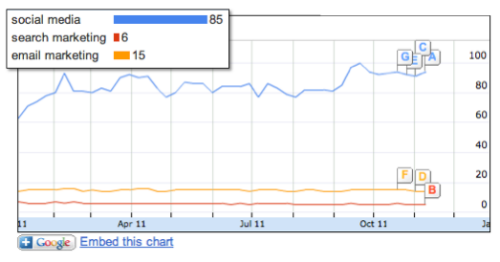For many years search has been the backbone of internet marketing. While effective on its own for a range of marketing objectives, namely product sales and lead generation, it’s the integration with other digital marketing tactics that can really elevate marketing program effectiveness.
It’s important for marketers to think more holistically about their search marketing programs because with brands and consumers empowered to publish 24/7 via mobile, tablet or computer, we live in an age of information overload. Increased competition for consumer attention, interest and engagement means marketing messages must do more to stand out and focus not only on transactional outcomes, but influence and branding.
For consumers, Google has been an effective filter for the billions of documents in its index handling over 11 billion searches per month on Google.com alone. But search isn’t enough to carry the day in most internet marketing programs.
There are challenges for marketers and for Google in anticipating changing consumer interests and the language used with search activity. Of the daily queries on Google, 16% have never been seen before. How can you keyword optimize and advertise for what’s never been searched on? How can advertisers tap into the ebb and flow of relevant topics that represent consumer interest, word of mouth and influence?
A bit part of that solution is the shift towards optimizing for customers and outcomes vs. a sole focus on keywords. Search terms are often seen as an objective when they are really a manifestation of what buyers care about relevant to the brand’s offering. Understanding customer needs, pain points and interests is the gateway to mining keyword data effectively. Of course determining keyword performance with organic search (with Google) is becoming much more difficult. However, Google AdWords advertisers won’t have that problem since keyword referrer data is not being masked on PPC traffic.
Search ads are highly effective and according to Google, search advertisers realize a 7:1 ROI on investments in search-based internet marketing. But search is changing even faster than in the past with continuous improvements in infrastructure and technology, changing online consumer behaviors and of course the growing influence of social media and mobile. Companies have not necessarily been quick to adapt to such changes as evidenced (for example) by the fact that only 33% of advertisers have a mobile optimized website.

Social media has been capturing the biggest share of media attention in the internet marketing world and it’s often warranted. Social networks have facilitated major changes from revolutionizing online gaming to facilitating revolutions in countries. However, social media investment is a kitten’s meow compared to the lion’s roar of search marketing budgets.
According to Forrester’s most recent Interactive Marketing Forecasts (2011 – 2016) for the U.S., interactive spend is to reach $76.6 billion by 2016. While social media spending will increase about 6% in that time, 43% of the overall interactive forecast by 2016 will be search marketing.
That said, the combination of social and search may be even more powerful and as marketers realize the benefit of integration, many will see significant returns. This is something we’ve been proponents of for many years at TopRank Online Marketing whether it’s optimizing social media content for better visibility in search results to incorporating social sharing features in online advertising and media.
The combination of social media with search is more than compelling. GroupM and comScore published a report called “The Virtuous Circle: The Role of Search and Social Media in the Purchase Pathway” which revealed that only 1% of respondents were led to purchase by social media alone. More than half (51%) arrived at purchase by search alone and 48% by a combination of search and social media. For even casual observers of the internet marketing space, it’s easy to see that the effect of that combined interaction will only increase in the future.
In response to the massive competition for online attention and changes in both consumer behaviors and expectations, I believe there are 3 areas marketers can optimize for a more strategic and holistic approach to successful internet marketing:
1. Optimize for Discovery – How does your target audience prefer to find information? Search, Social, Email, Advertising, Word of Mouth. What devices do they use? When are they most likley to search, socialize or purchase?
2. Optimize for Consumption – What content formats and media types does your community prefer? Do they like long or short form? Text, images, audio or video?
3. Optimize for Engagement – What messages, topics and contexts motivate your community to interact, share and convert?
There’s a diversity of influences for consumers as they discover, consume and engage with content and advertising messages online. An integrated approach that empathizes with consumer needs, pain points and position in the buying cycle will help marketers improve their relevance and effectiveness while providing for a better user experience with their target audience.
Within the universe of customer influences and experiences there’s a constellation of opportunities for online marketers to attract, inspire and engage their target audiences. A holistic mix of paid, owned, earned and social media provides marketers a much better platform for attracting, engaging and activating customers. The question for marketers to answer is, “Do you know enough about your customers, where they spend time online, what they’re influenced by and what key messages and experiences with motivate them to action?”
How are you integrating paid search or even organic search with social media, content, email and other forms of online marketing? Have you had any obstacles in getting integrated search programs budgeted? Implemented?



